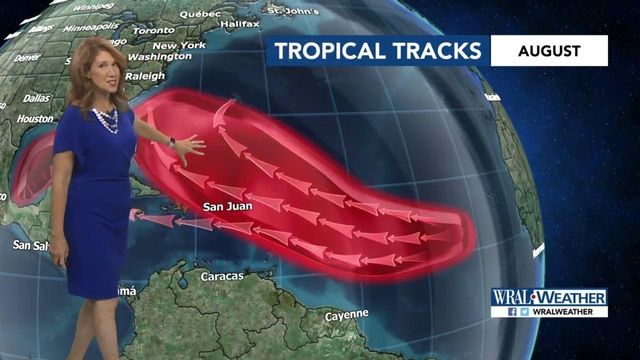Tracking the tropics: Eyes turn to Africa for storms that impact North Carolina
Forecasters are currently watching two tropical systems, but there are no current indications that either will significantly impact North Carolina. One off the coast of Africa bears watching.
Posted — UpdatedAugust marks the start of increased tropical activity, and systems that develop off the coast of Africa have the most potential to affect North Carolina and surrounding states, according to WRAL meteorologist Elizabeth Gardner.
Forecasters are currently watching two weather systems that become tropical depressions, but there are no current indications that either will significantly impact North Carolina. One, moving west off the coast of Africa, bears watching.
The system has a 20 percent chance of developing in the next two days and a 70 percent chance of developing in the next five days. If it is named, it would be named Chantal.
"Those tend to stick closer to the east coast and have a bigger affect on us here in August," Gardner explained.
Hurricane season peaks in late August and continues through mid-September.
"After that, it falls off pretty quickly," Gardner said.
According to Gardner, most tropical systems develop in the Gulf of Mexico, because ocean temperatures are warmer there, and, at 80 degrees or higher, give energy to the storms.
"They're feeding off warm ocean temperatures -- and that makes the fuel for storms," Gardner said.
The second most likely place for storms to develop is in the Caribbean, she said, which usually propels storms up to the Gulf of Mexico.
You can track the tropics anytime with WRAL's interactive hurricane tracker.
Related Topics
• Credits
Copyright 2024 by Capitol Broadcasting Company. All rights reserved. This material may not be published, broadcast, rewritten or redistributed.





